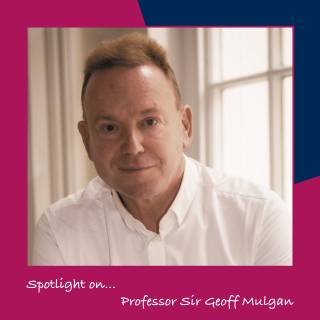Professor Sir Geoff Mulgan is a Professor of Collective Intelligence, Public Policy and Social Innovation at UCL STEaPP.
 How long have you been at STEaPP? What does your role involve?
How long have you been at STEaPP? What does your role involve?

I’ve been at STEaPP since early 2020. My role involves some teaching – I teach undergraduates, post graduates and PhDs; some research, in particular helping run the International Public Policy Observatory (IPPO), which orchestrates evidence for governments across the UK, with my role leading on engaging the decision-makers, as well as topics including net zero and spatial inequality.
I also write books. One was published this year ‘When Science Meets Power’ (Polity Press, 2024), on science and politics; ‘Prophets at a Tangent’ (Cambridge University Press, 2023) on art; and ‘Another World is Possible’ (Hurst/OUP, 2022) on social imagination. I’m also finishing my next one which focuses on ‘exploratory social science’.
I also work with various governments around the world on policy projects.
What drew you to STEaPP and UCL?
I had always wanted to be an academic (ever since failing to get an academic job after doing my PhD!). I had previously been a visiting professor at UCL, and always admired its eclectically brilliant faculty and its position in London. STEaPP appealed as I had become increasingly fascinated by the interplay of science, technology, politics and policy.
How does your research feed into your teaching (and vice versa)?
Some of my main areas of research – in particular, collective intelligence and how systems work - are reflected in the courses I teach as part of the BSc and the MPAs. I’ve also in the past done a lot on what I called the ‘challenge-based university’, exploring how universities could focus more on problems and questions rather than being trapped in disciplinary boundaries.
What inspires you?
I tend to get inspired by seeing very practical projects, especially when they succeed against the odds, without much access to power, status and money. That’s why I’ve remained involved in the global social innovation field for many years – it means constantly coming across people who are achieving change for the better.
What achievements are you most proud of?
I’ve had the good fortune to be involved in lots of projects and initiatives that have had quite a lot of impact – from large scale social policies cutting poverty and some of the world’s first decarbonisation strategies to creating new organisations, as well as helping to grow new fields, such as the creative economy, social innovation and collective intelligence.
Who influenced you?
All sorts of people, from the Buddhist thinker Nyanaponika Thera to the social entrepreneur Michael Young to the anthropologist Mary Douglas. Often the most important influences come less through the answers these people offered than through the questions they prompted.
If you could give one piece of advice to your teenage self, what would it be?
Keep a diary. We often learn best by articulating what we think will happen in the world, observing what actually happens, and then revising our way of seeing the world. But most people do the opposite and simply ignore inconvenient facts, which means they never really learn!
What piece of advice would you like to give to a student?
Cultivate a T shaped mind: go deep in some field, but also ensure you have the breadth to see how it connects to other areas of knowledge, and remain hungry for new ideas, new facts and for interacting with people who see things very differently from you.
What three words would you use to describe STEaPP?
Eclectic, smart and boundary-crossing.
 Close
Close

